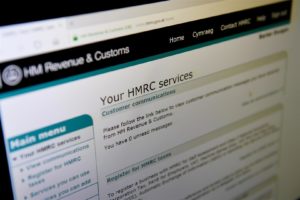 HMRC has a set up a phone helpline to support businesses and self-employed people concerned about not being able to pay their tax due to coronavirus (COVID-19).
HMRC has a set up a phone helpline to support businesses and self-employed people concerned about not being able to pay their tax due to coronavirus (COVID-19).
The helpline allows any business or self-employed individual who is concerned about paying their tax due to coronavirus to get practical help and advice. Up to 2,000 experienced call handlers are available to support businesses and individuals when needed.
If you run a business or are self-employed and are concerned about paying your tax due to coronavirus, you can call HMRC’s helpline for help and advice: 0800 0159 559.
For those who are unable to pay due to coronavirus, HMRC will discuss your specific circumstances to explore:
- agreeing an instalment arrangement
- suspending debt collection proceedings
- cancelling penalties and interest where you have administrative difficulties contacting or paying HMRC immediately
The helpline number is 0800 0159 559 – and is an addition to other HMRC phone contact numbers.
Opening hours are Monday to Friday 8am to 8pm, and Saturday 8am to 4pm. The helpline will not be available on Bank Holidays.
Read more about further support for those affected by COVID-19
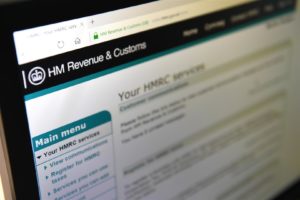 Businesses that fail to pay their workers the National Minimum Wage or National Living Wage will continue to be publicly named by the government, following a review of the scheme.
Businesses that fail to pay their workers the National Minimum Wage or National Living Wage will continue to be publicly named by the government, following a review of the scheme.
The naming scheme will resume calling out businesses failing to pay their workers the National Minimum Wage, while increasing support for employers to comply with NMW legislation. The changes, which will see naming rounds occur more often, will enhance the effectiveness of the measure as a deterrent.
The government has also increased the threshold for naming employers, meaning that firms which owe arrears of more than £500 in National Minimum Wage payments to their workforces will now be named. The threshold was previously £100. This new proportionate approach will mean that some businesses falling foul of the rules by minimal sums will not be named, provided they correct any errors. These businesses that underpay by less than £100 will have the chance to correct their mistakes without being named, still have to pay back workers and can face fines of up to 200% of the arrears.
Business Minister Kelly Tolhurst said: “Anyone who is entitled to the minimum wage should receive it – no ifs, no buts – and we’re cracking down on companies that underpay their workers.
“We also want to make it as easy as possible for employers, especially small businesses and those trying to do right by their staff, to comply with the NMW rules, which is why we’re reforming regulations.”
The government is today changing regulations to widen the range of pay arrangements available to business employing ‘salaried hours workers’, which are workers who receive an annual salary in equal instalments for a set number of contracted hours.
Under these changes, workers who are often paid hourly or per day and consequently have different pay checks every month, such as those in the retail industry, can be classified as salaried workers.
The changes will provide more flexibility in how salaried workers are paid, without reducing protections for workers. At the same time, businesses employing these workers are less likely to caught out by the NMW legislation due to the differences in their hours from one month to the next.
These changes include:
- permitting additional payment cycles for salaried workers, including fortnightly and 4-weekly cycles, providing choice and flexibility to employers and workers
- allowing employers to choose the ‘calculation year’ fit for their workers, helping them to better monitor the hours worked by salaried workers and identify potential underpayment of wages
- ensuring salaried workers can receive premium pay, for example for working on Bank Holidays, without losing their entitlement to equal and regular instalments in pay
These changes are expected to come into force on 6 April 2020, subject to normal Parliamentary approvals.
Matthew Taylor, Director of Labour Market Enforcement, said: “I welcome today’s announcement by the government and believe employers will benefit from the greater clarity these revisions bring to the minimum wage rules for salaried workers.
“Particularly welcome is the news of the reintroduction of the NMW Naming Scheme, that both recognises the sharper focus advocated by my predecessor and follows a stronger compliance and education approach to help employers get it right.”
Additionally, the government has decided that employers offering salary sacrifice and deductions schemes will no longer be subject to financial penalties if the scheme brings payment below the National Minimum Wage rate (which can be up to 200% of arrears).
For example, benefit schemes where staff buy products from their employer and pay for these via salary deductions. The waiver will be subject to strict criteria – including that the worker has opted into the scheme.
Deductions of NMW for uniform and other items connected with the worker’s employment will continue to be penalised. Full details will be published later today in the National Minimum Wage enforcement policy document.
As well as making changes to the rules, the government is doing more to support businesses to comply with National Minimum Wage, so that they pay their staff correctly first time. The government will:
- improve NMW guidance available through the GOV.UK website, making it more accessible and easier to navigate. This includes new thematic guides on specific compliance issues, such as pay deductions and uniform policy. This revamped guidance will be published shortly.
- proactively support new, small businesses. HMRC will visit selected new, small businesses to educate them on the National Minimum Wage and support those businesses in getting their practices right from the start
- provide more support via a helpline for employers who operate deduction or salary sacrifice schemes. Employers will be able to access support and information directly from HMRC
This update to National Minimum Wages regulations comes ahead of a major overhaul of labour market enforcement, with the creation of a Single Enforcement Body to crack down on employment law breaches, set to be announced as part of the forthcoming Employment Bill.
Additional information
- a worker is classified as doing ‘salaried hours’ work if they are paid a set number of hours each year under their contract and an annual salary in equal weekly or monthly amounts
- workers cannot currently be classified as salaried hours if they are paid every 2 or 4 weeks. These workers are ‘time-paid’ workers, paid hourly or per day. This will change, giving greater stability to workers and clarity about earnings. It is likely to affect a relatively small number of workers, particularly in the retail industry
- premium payments: under the current NMW rules, premium payments (such as for working on a bank holiday) can prohibit workers from being treated as salaried workers under the NMW regulations and this could affect enforcement by HMRC
The government is committed to NMW enforcement:
- budget for enforcing £27.4 million for 2019 to 2020, up from £13.2 million in 2015 to 2016
- in 2018 to 2019, HMRC identified £24.4 million in arrears, for over 220,000 workers
- in 2018 to 2019, a record amount of penalties (over 1,000) issued, totalling over £17 million
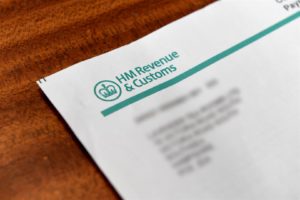 With two weeks to go until the 31st January Self Assessment deadline, HMRC recaps the strangest and most imaginative excuses and expense claims received over the past 10 years.
With two weeks to go until the 31st January Self Assessment deadline, HMRC recaps the strangest and most imaginative excuses and expense claims received over the past 10 years.
Every year, HMRC receives some imaginative excuses and expense claims following the 31st January Self Assessment deadline.
To wrap up the decade, and with 2 weeks to the deadline, HMRC has highlighted ten of the weirdest and wonderful excuses they have received from customers who missed the deadline over the last decade.
The top 10 most bizarre excuses and questionable expenses claims for items, in reverse order, are:
- Caravan rental for the Easter weekend
- I was up a mountain in Wales, and couldn’t find a post box or get an internet signal
- My dog ate the post … again
- claiming £4.50 for sausage and chips meal expenses for 250 days
- My hamster ate my post
- I’ve been cruising round the world in my yacht and only picking up post when I’m on dry land
- A music subscription so I can listen to music while I work
- Pet food for a Shih Tzu ‘guard dog’
- A DJ was too busy with a party lifestyle – spinning the deck….in a bowls club
- My mother-in-law is a witch and put a curse on me
All the excuses and expenses listed above were unsuccessful.
Angela MacDonald, HMRC Director General of Customer Services, said: “Each year, we try to make it as easy and simple as possible for our customers to complete their tax returns and the majority make the effort to do theirs’ right and on time. But we still come across some unusual excuses and expenses, which range from problems with a mother-in-law to yachts set on fire.
“We always offer help to those who have a genuine excuse for not submitting their return on time. It is unfair to the majority of honest taxpayers when others make bogus claims.
“If you think you might miss the 31 January deadline, get in touch with us now – the earlier we’re contacted, the more we can help.”
The deadline for sending Self Assessment tax returns for the 2018 to 2019 tax year to HMRC and paying any tax owed is 31 January 2020.
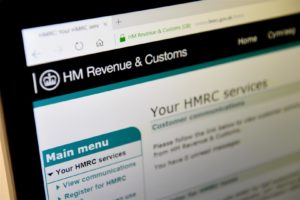 The smashing of international criminal gangs, large money laundering seizures and fake investment schemes all feature in HM Revenue and Customs’ top criminal cases of 2019.
The smashing of international criminal gangs, large money laundering seizures and fake investment schemes all feature in HM Revenue and Customs’ top criminal cases of 2019.
HMRC’s fraud investigations have led to more than 600 individuals being convicted for their part in tax crimes and commenced new criminal investigations into more than 610 individuals during the last 12 months. The Fraud Investigation Service continues to bring in around £5 billion a year through civil and criminal investigations.
This year’s top criminal cases include:
- 2 wealthy professionals who attempted to steal more than £60 million through a fraudulent tax avoidance scheme which claimed to invest in HIV research and conservation, and were jailed for a total of 14 and a half years
- A Berkshire-based gang that stole £34 million in VAT and laundered £87 million, the proceeds from selling illicit alcohol through bank accounts in Britain, Cyprus, Hong Kong, Dubai and other countries – were jailed for more than 46 years
- a fugitive £17 million tax fraudster who is finally behind bars after he was tracked down to his Prague hideaway and brought back to the UK to serve his 8-year sentence
- five people, including the former owners of a Sussex petrol station, who were sentenced for distributing and selling an estimated 4.8 million litres of illicit fuel to unsuspecting motorists, including haulage companies across the South East
- the jailing of a former Top Gear mechanic who helped father and son tax cheats escape from the UK via ferry and Eurotunnel prior to sentencing for a £1 million VAT fraud
- payback time for 5 wealthy tax fraudsters who were involved in one of the UK’s biggest tax frauds
- an apparently jobless Londoner who enjoyed a sociable lifestyle of golf and exotic holidays by dodging tax on smuggled tobacco has been jailed
- a charity treasurer who tried to steal more than £330,000 in a Gift Aid repayment fraud and spent the money on lavish cruise holidays
- our work with Interpol to take apart a pan-European crime gang involved in cigarette trafficking, drug smuggling and money laundering
As well as successful prosecutions, HMRC issued a record £7.8 million fine to a money service business in West London for breaching the money laundering regulations. There was a major seizure in Northern Ireland, worth around £2 million in lost duty and taxes, by the Paramilitary Crime Task Force (of which HMRC is a part) targeting the criminal activities of paramilitary organised crime groups.
Simon York, Director of the Fraud Investigation Service, said: “The majority of people pay their taxes but there remains a hard core who have zero interest in playing by the rules. These prosecutions clearly show that we’ll relentlessly pursue those criminals who would try and cheat honest taxpayers by stealing money destined for vital public services.
“It means we’re increasingly taking on ever more complex frauds and well-resourced opponents, including tackling organised criminals who would otherwise undermine our economy and harm our communities.”
 HM Revenue and Customs is warning millions of Self Assessment customers to be aware of fraudsters in the run-up to the January 31st deadline.
HM Revenue and Customs is warning millions of Self Assessment customers to be aware of fraudsters in the run-up to the January 31st deadline.
Over the last year, HMRC received nearly 900,000 reports from the public about suspicious HMRC contact – phone calls, texts or emails. More than 100,000 of these were phone scams, while over 620,000 reports from the public were about bogus tax rebates.
Some of the most common techniques fraudsters use include phoning taxpayers offering a fake tax refund or pretending to be HMRC by texting or emailing a link which will take customers to a false page, where their bank details and money will be stolen. Fraudsters are also known to threaten victims with arrest or imprisonment if a bogus tax bill is not paid immediately.
HMRC operates a dedicated Customer Protection team to identify and close down scams but is advising customers to recognise the signs to avoid becoming victims themselves. Genuine organisations like HMRC and banks will never contact customers asking for their PIN, password or bank details. Customers should never give out private information, reply to text messages, download attachments or click on links in texts or emails which they are not expecting.
Customers are urged to take action by forwarding details of suspicious calls or emails claiming to be from HMRC to phishing@hmrc.gov.uk and texts to 60599. Customers who have suffered financial loss should contact Action Fraud on 0300 123 2040, or use their online fraud reporting tool.
Customers can find out more information on GOV.UK on how to avoid and report scams and recognise genuine HMRC contact. If customers think they have received an HMRC-related phishing email or text message, they can check it against examples on GOV.UK.
Tax is automatically deducted from most UK taxpayers’ wages, pensions or savings. Where tax is not automatically deducted, or when people or businesses have earned additional untaxed income, they are required to complete a Self Assessment tax return each year.
People need to complete a tax return if they:
- earned more than £2,500 from renting out property
- or their partner received Child Benefit and either of them had an annual income of more than £50,000
- received more than £2,500 in other untaxed income, for example from tips or commission
- are self-employed sole traders
- are employees claiming expenses in excess of £2,500
- have an annual income over £100,000
- earned income from abroad that they need to pay tax on
Further information:
- Self Assessment guidance is available on GOV.UK
- If customers are completing their Self Assessment online for the first time, they need to register for Self Assessment Online. It can take a few days for the registration to arrive in the post, so it’s important that customers do it as soon as possible. They should contact HMRC for support if they’re concerned about missing the deadline.
- Be aware of copycat websites and phishing scams – always type in the full online address www.gov.uk/hmrc to obtain the correct link to file your Self Assessment return online securely and free of charge.
- Customers can also register for HMRC’s help and support email service online or by going to GOV.UK and searching ‘HMRC videos, webinars and email alerts’.
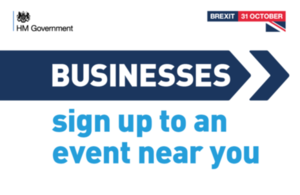 Departments across government are holding events to help your business get ready for Brexit.
Departments across government are holding events to help your business get ready for Brexit.
After Brexit there will be changes that affect businesses and hauliers across the UK.
Make sure you are prepared for them, particularly if your business:
- imports goods
- exports goods
- receives personal data
- exports services
Local business readiness events
The Department for Business held a series of free face-to-face Business Readiness Events across the UK, to help businesses find out what actions they need to take to prepare for Brexit. The events included support and advice stands, with in-depth sessions led by subject matter experts from across government, including Defra, HMRC, Home Office and DCMS.
More information could be found about a range of issues, including:
- the importing and exporting of goods and services
- transferring data
- employing EU citizens
The Brexit Business Readiness Events events have now ended but if you were unable to attend one, you can view the Government’s online event which features recordings of the sessions held at the events.
Helping hauliers prepare for Brexit
The Department for Transport is setting up information pop-up stands across the UK and Europe to help hauliers and businesses prepare for Brexit, so that goods can continue to flow smoothly through ports.
The pop-ups will be located at ports, service stations and on ferries to provide easily accessible advice, helping hauliers understand the documentation they need for themselves, their vehicles and their goods after Brexit. All stands will be staffed by multilingual advisors. Further advice for hauliers is available on GOV.UK.
Brexit preparedness workshops for businesses that export
Businesses will leave these workshops with a personalised action plan for Brexit preparedness. The workshops will provide advice on:
- impact to supply chains
- changes to regulations and contracts
- where to find tariff information
- what businesses might need to speak to customers and employees about
Find your nearest event and sign up: please note that locations are still being added.
HMRC webinars to help customers get ready for Brexit
HMRC is running Get Ready for Brexit webinars during October, which provide an overview of everything UK businesses involved in the movement of goods between the EU and the UK need to know to keep goods moving after 31 October.
Sign up for one of the webinars at Get Ready for Brexit.
For those unable to make any of the sessions, the webinar has been recorded on GOV.UK.
Share this page
 HMRC is stepping up efforts to ensure businesses are ready to trade post-Brexit by automatically enrolling companies in an important customs system and doubling the numbers registered, the Chancellor has announced.
HMRC is stepping up efforts to ensure businesses are ready to trade post-Brexit by automatically enrolling companies in an important customs system and doubling the numbers registered, the Chancellor has announced.
More than 88,000 VAT registered companies across the UK will be allocated an Economic Operator Registration and Identification (EORI) number in the next two weeks in order to keep trading with customers and suppliers in the EU after the UK has left.
72,000 companies have already registered for EORI numbers. With Brexit preparations accelerated under the new government, ministers are taking decisive action to speed up the rollout of the scheme to help ensure the smooth transit of goods.
EORI numbers are a unique ID number allocated to businesses that enables them to be identified by Customs authorities when doing business with other traders.
If businesses do not have an EORI number post-Brexit, they will be unable to continue to trade with EU Member States.
Letters informing businesses of automatically allocated EORI numbers will start arriving today as the Government steps up efforts to ensure the UK is ready for Brexit.
Chancellor of the Exchequer Sajid Javid said: “As the government accelerates its preparation to leave the EU on 31st October, it’s right businesses are prepared too.
“There can be no time for delay which is why HMRC has allocated thousands of businesses with a trading number to ensure they can continue to trade their goods through Europe from day one. This will help ease the flow of goods at border points and support businesses to trade and grow.”
The Chancellor has been determined to grip Brexit preparations, allocating an extra £2.1 billion for government departments last month to prepare for no deal, doubling Brexit funding for this year.
As part of the cash injection, border and customs operations will receive an additional £344m to be ready for Brexit, including by hiring more border officers, doubling the support available for customs agents, and improving transport infrastructure around ports.
Additional information:
If a business is not VAT-registered, it will still need to register for an EORI number. Information on how to register can be found here
Getting an EORI number is one of the steps that businesses need to action urgently to be prepared for leaving the EU
After getting an EORI number, businesses will need to decide whether to complete customs declarations themselves, or employ a customs agent to do this. As part of the £2.1bn announced on 31 July, we are doubling the support made available for customs agents to train new staff or invest in better IT so businesses can get the support they need to complete customs declarations. If employing a customs agent, businesses will need to supply their EORI number. Information to inform this decision can be found here
Traders also need to decide whether to apply for Transitional Simplified Procedures to make it easier to import goods from the EU. Find out how to register here
Letters to businesses containing their assigned EORI number will arrive within two weeks
If businesses have been issued a UK EORI number by HMRC and then apply online, they will receive a message to say that they already have one
HMRC advises businesses to contact HMRC if they are unsure. HMRC will be able to confirm whether a number has been assigned
Working parents could be entitled to Tax-Free Childcare worth up to £2,000 per child per year to pay towards regulated holiday clubs during the school holidays.
Parents can choose from more than 68,000 childcare providers that have signed up, including school and summer camps across the country.
If parents pay into their Tax-Free Childcare account regularly, they can ‘save up’ their money and use it for childcare during school holidays. For every £8 that families pay in, the government will make a top-up payment of an additional £2. The money saved can be put towards a whole range of other childcare options, including before and after school care when term time starts again in September.
The scheme is open to working parents, including the self-employed, who earn between the minimum wage and £100,000 per year and have children aged 0-11 years old.
Liz Truss, Chief Secretary to the Treasury, said: “We understand making arrangements for summer childcare at this time of year is important and can be a stressful time for parents.
“Tax-Free Childcare makes things easier, putting more money in the pockets of parents and supporting as many families as possible to secure high-quality, affordable childcare.
“Parents should visit the Childcare Choices website and take advantage of the range of offers to help balance their work and family lives while saving money.
You can find out more and apply through the Childcare Choices website, www.childcarechoices.gov.uk. It includes a Childcare Calculator that compares all the government’s childcare offers to check what works best for individual families.
How Tax-Free Childcare works
Working parents can apply, through the childcare service, to open an online childcare account. The scheme is available for children under the age of 12, or under the age of 17 for children with disabilities.
If you or your partner have an ‘adjusted net income’ over £100,000 in the current tax year, you will not be eligible. This includes any bonuses you expect to get.
For every £8 that families pay in, the government will make a top-up payment of an additional £2, up to a maximum of £2,000 per child per year (or £4,000 for disabled children). This top-up is added instantly and parents can then send payments directly to their childcare providers. The maximum government top-up is £500 per quarter for each child, or £1,000 if the child is disabled.
All registered childcare providers – whether nannies, nurseries, childminders or after-school clubs – can sign up online now to receive parents’ payments through Tax-Free Childcare.
Parents need to sign back in every three months and confirm their details are up-to-date, to keep getting government top-ups.
Fraudsters have increasingly mimicked legitimate HMRC helpline numbers (often beginning with 0300) to dupe taxpayers and steal money. Last year alone, HMRC received over 100,000 phone scam reports.
The ‘spoofing’ scam worked as taxpayers would receive calls and, on checking the numbers online, would find they appeared to belong to HMRC. This often led people to believe fake calls were real and enabled fraud.
The new controls, created in partnership with the telecommunications industry and Ofcom, will prevent spoofing of HMRC’s most used inbound helpline numbers and are the first to be used by a government department in the UK.
Criminals may still try and use less credible numbers to deploy their scams – but that means they will be easier to spot. Check GOV.UK for how to avoid and report scams and recognise genuine HMRC contact.
Financial Secretary to the Treasury Jesse Norman MP said: “This is a huge step forward in the fight against phone fraud. HMRC’s new controls will help to protect thousands of hardworking taxpayers and their families from these heartless criminals. Vigilance will always be important but this is a significant blow to the phone cheats.”
Head of Action Fraud Pauline Smith said: “Phone calls are one of the top ways for fraudsters to make contact with their victims. Between April 2018 and March 2019, one in four phishing reports made to Action Fraud were about fraudulent phone calls.
“It is encouraging to see that these newly developed controls by HMRC have already achieved a reduction in the number of calls spoofing genuine HMRC numbers. If you believe you have fallen victim to a fraudster, please report it to Action Fraud.”
Since the controls were introduced in April this year, HMRC has reduced to zero the number of phone scams spoofing genuine inbound HMRC numbers. This has resulted in the tax authority already receiving 25% fewer scam reports against the previous month.
HMRC will continue to work with network providers to eradicate fraudulent numbers that are reported, and during the last 10 months has requested the removal of over 1,050 numbers from being used by scammers.
Criminals often target the elderly and vulnerable using HMRC’s brand as it is well known and adds credibility to a fraudster’s call, though this will now be significantly harder to do.
HMRC will only ever call you asking for payment on a debt that you are already aware of, either having received a letter about it, or after you’ve told us you owe some tax, for example through a Self Assessment return. Changes the department makes this month also mean you will never have to read aloud your card details to an operator.
If anyone is ever in doubt about who they are speaking to, check the number and end the call. You can contact HMRC using one of the helpline numbers or online services available from GOV.UK.
Further information
Statistics on HMRC phone scams
HMRC has seen an increasing number of phone scams against UK taxpayers:
- 2016 to 2017: 407 reports
- 2017 to 2018: 7,778 reports
- 2018 to 2019: 104,774 reports
How to spot a scam
Thanks to HMRC’s controls, scammers will now be forced to use much less credible looking numbers but you should still be vigilant as scammers may try spoof other numbers. Our advice for avoiding phone scams is:
- recognise the signs – genuine organisations like banks and HMRC will never contact you out of the blue to ask for your PIN, password or bank details
- stay safe – don’t give out private information, reply to text messages, download attachments or click on links in emails you weren’t expecting
- take action – forward details of suspicious calls claiming to be from HMRCto phishing@hmrc.gov.uk and texts to 60599, or contact Action Fraud on 0300 123 2040 or use their online fraud reporting tool if you suffer financial loss
- check GOV.UK for how to avoid and report scams and recognise genuine HMRC contact
- listen to an example of what a phone scam sounds like on Twitter
- if you think you have received an HMRC related phishing or bogus email or text message, you can check it against examples.
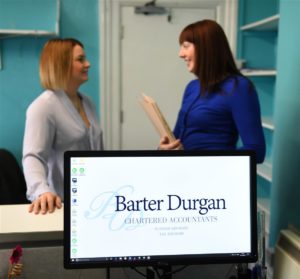 We are looking for a senior member to join our team.
We are looking for a senior member to join our team.
The candidate must have experience of working in an accounting practice and be qualified to at least AAT level or equivalent.
Candidates must have:
- An excellent knowledge of Xero and Sage, other bookkeeping programs would be beneficial.
- A knowledge of Iris (our practice software) would be preferential but not essential.
- Knowledge of production of accounts for sole traders, limited companies & partnerships and the PAYE system including CIS, would be beneficial.
The role will include client contact, being able to advise clients and being approachable and personable.
Salary will depend on applicant’s qualifications, experience and knowledge.
Please forward applications to John Pache at pachej@barterdurgan.co.uk





